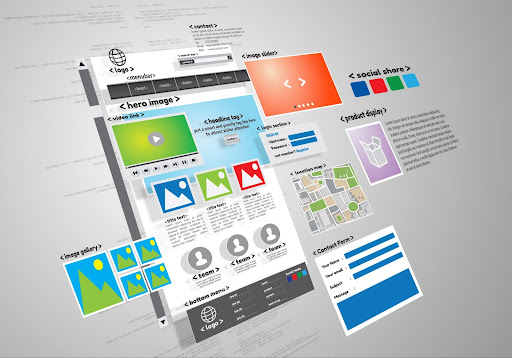Imagine your website platform as the foundation of a house: you wouldn’t build your dream home on a shaky base. In the same vein, your website’s foundation deserves thoughtful consideration. Each platform comes with its own strengths, tailored to different needs and skill levels.
In this guide, we’ll be your compass through the sea of options, offering insights into various platforms that hold the potential to bring your digital vision to life. We’ll explore the merits and nuances of popular choices, illuminating the path to selecting the one that best aligns with your goals.
Table of Contents
ToggleThe Advantages of Website Builders
In the realm of website creation, the financial aspect is a crucial factor that can influence the trajectory of your digital journey.
While the average cost of a professionally designed website can range from $1,000 to $8,000 and beyond, website builders offer a cost-effective alternative that doesn’t compromise quality.
Let’s explore the advantages of using a website builder and how it empowers you to exercise absolute control over your online presence while keeping expenses in check.
Budget-Friendly Solution
One of the most significant advantages of using a website builder is the substantial cost savings it offers. The expenses associated with hiring a professional designer can accumulate rapidly, especially when changes or updates are required down the line.
In contrast, a website builder presents a budget-friendly option that doesn’t break the bank, making it an ideal choice for individuals, startups, and small businesses with limited resources.
Control Over Design
Website builders provide a canvas for you to express your creative vision without the limitations of traditional templates. Whether you personally craft your website or hire a developer, you retain unparalleled control over every aspect of design.
From selecting fonts that resonate with your brand’s personality to choosing color schemes that evoke specific emotions, the power lies in your hands.
Captivating visuals are integral to a memorable online experience. Website builders empower you to seamlessly integrate galleries, slideshows, and even video backgrounds into your website. This dynamic engagement captures visitors’ attention and encourages them to explore your content further, enhancing their connection with your brand.

Strategic Design Placement
The placement of call-to-action (CTA) buttons can significantly impact user engagement and conversions. With a website builder, you have the flexibility to strategically position these buttons for optimal visibility and impact. This level of control ensures that your CTAs effectively guide visitors toward your desired actions, whether making a purchase, subscribing to a newsletter, or contacting you.
Ultimately, the advantages of using a website builder go beyond mere cost savings; they encompass the empowerment to shape your online presence in alignment with your unique vision.
Whether you’re seeking to establish a personal blog or a business striving to create an impactful e-commerce site, a website builder provides a dynamic platform that bridges affordability with customization.
Here are five things to consider when choosing a platform to build your website.
1. Software Features: Tailoring Your Website Building Experience
As you venture into the world of website building, one of the first and most critical considerations is the array of software features each platform offers. These features can shape your website’s capabilities, design, and functionalities, determining whether your digital creation is a simple web presence or a dynamic online storefront. Let’s delve deeper into this pivotal aspect, focusing on the offerings of some prominent platforms.
If your goal is a straightforward website without the complexities of advanced features, platforms like Wix and Squarespace can be your allies. These builders excel in catering to users who seek elegant simplicity.
Whether you’re a blogger, a creative professional, or a small business owner, their user-friendly interfaces and pre-designed templates provide an excellent starting point.
For those with aspirations of an online store, Shopify shines as a dedicated e-commerce platform. Its features extend beyond just website creation, encompassing retail point-of-sale systems that seamlessly integrate online and physical store experiences.
Alongside this, Shopify offers robust stock images, photo editing tools, and shopping cart features that empower you to establish and manage a full-fledged online retail space.
If you’re already aligned with a specific content management system (CMS), such as WordPress, FatCow, and iPage offer compatibility that allows you to integrate their services seamlessly. Whether you’re looking to enhance an existing website or build anew within the confines of a familiar CMS, these options provide the bridge you need.
As you consider these software features, remember that your choice should align with your website’s overarching vision. Are you aiming for a minimalist blog, a vibrant portfolio, or a comprehensive online store? Every website platform’s offerings are tailored to specific needs, and making the right choice can significantly impact the success and functionality of your website.

2. Crafting the Perfect Web Identity: The Importance of Website Templates
In the mosaic of website creation, the template you choose forms the very foundation of your digital identity. A well-designed template is not just a visual element; it’s a window into your brand, your content, and your unique voice.
A website template is like a blueprint for your digital space. It dictates the arrangement of your menus, the harmonious interplay of colors, the subtleties of background elements, and the alignment of photos and text. Each element contributes to the overall user experience, guiding visitors through your content with ease and aesthetics.
When selecting a website builder, a plethora of templates is a testament to the platform’s versatility. A template-rich builder ensures that your site doesn’t become a cookie-cutter duplicate of someone else’s. Instead, you have the power to select a template that resonates with your brand and narrative, allowing you to stand out in the sea of digital voices.
While quantity matters, quality is paramount. The templates you choose should reflect the professionalism and uniqueness of your brand.
A high-quality template not only engages visitors but also instills trust and credibility. When your website boasts a design that feels both sophisticated and user-friendly, it encourages visitors to stay, explore, and ultimately pursue what your site has to offer.

3. Navigating the Value Proposition: Free vs. Paid Website Builders
As you embark on the journey to establish your online presence, a pivotal decision awaits: whether to opt for a free website builder or invest in a paid platform. Your choice has implications for your website’s control, scalability, branding, and overall potential.
Free website builders, like WordPress, can be a fantastic starting point, especially if your budget is limited. They offer an accessible entry into the digital realm, allowing you to craft a basic website without incurring any financial commitment. This is particularly appealing to individuals and small businesses who are testing the waters and want to get their message out without substantial financial investment.
The Downside of Free: Trade-offs and Limitations
However, free comes with trade-offs. While these platforms enable you to build a website without financial overhead, they often impose limitations. For instance, you might not have the freedom to connect your own domain, which can affect the professional appearance of your website.
Additionally, free platforms often require you to display the company’s ads on your web pages, detracting from the cohesion and branding of your site.
The Paid Proposition: Greater Control and Flexibility
Paid website builders, although involving a financial commitment, offer enhanced value and control. They provide more storage, tools, and bandwidth, allowing you to build a more comprehensive and feature-rich website.
With a paid plan, you gain the autonomy to connect your own domain, which is crucial for maintaining a professional and trustworthy online presence.
The ability to use your own domain is not just a technicality; it’s a branding strategy. With a paid plan, you eliminate the annoyance of third-party ads cluttering your website. This reinforces the cohesiveness of your brand, contributes to a more user-friendly experience, and builds trust among your visitors.
In the end, the choice between free and paid website builders boils down to your goals and aspirations. A free platform might suffice if you’re launching a personal blog or a basic informational site. However, if you’re a growing business, an aspiring e-commerce entrepreneur, or someone seeking greater control over their digital identity, investing in a paid platform provides the tools, branding autonomy, and scalability necessary for your journey.

4. The Power of Brand: Navigating Recognition and Reliability
In the dynamic landscape of website builders, the brand you choose holds more significance than meets the eye. It’s not just a name; it’s a reflection of the platform’s reputation, reliability, and the value it brings to your digital endeavor.
When it comes to brand selection, you’re essentially choosing between industry leaders and lesser-known contenders. Opting for a recognized brand can offer peace of mind and assurance, as these platforms have earned their status through years of excellence and innovation.
While it might be tempting to choose a lesser-known brand for the sake of a cheaper or free deal, it’s essential to weigh the potential trade-offs.
Often, these unfamiliar platforms might come with hidden costs, lackluster customer support, or limitations that hinder your website’s growth and potential. Going with an established brand might involve a slightly higher cost, but it also brings reliability, customer support, and a track record of success.
Consider the enduring giants of the industry: Network Solutions, GoDaddy, Register.com, and Web.com. These platforms have collectively served users for several decades, with Network Solutions boasting an impressive 41 years in operations. Such longevity isn’t just a testament to their resilience; it indicates that they’ve consistently adapted to industry trends and customer needs.
Recognition matters and several of these esteemed platforms have been honored with Webby Awards. This accolade isn’t just a pat on the back; it indicates that these platforms have consistently delivered excellence in web-related services. You can trust that a platform with a Webby Award under its belt is committed to offering exceptional results.

5. Elevating Engagement through Design Excellence
In the realm of website creation, design reigns supreme. It’s not just about visual appeal; it’s about crafting an immersive digital experience that captivates visitors, encourages interaction, and leaves a lasting impression. As you embark on the journey to establish your online presence, consider the role of design and the platforms that excel in delivering it.
Your website’s design is more than just aesthetics; it’s a digital reflection of your brand’s essence and creative vision. Finding a professional who can translate your aspirations into a visually appealing digital landscape is paramount.
This designer should be skilled in crafting layouts that align with your preferences while also understanding the nuances of user experience to optimize engagement.
A well-crafted design isn’t just about making your website look good; it’s about facilitating optimal interest and interaction. This involves strategic placement of elements, intuitive navigation, and attention to user flow. When a design is executed thoughtfully, it guides visitors seamlessly through your content, encouraging them to explore and engage.
When it comes to design prowess, a few platforms stand out as leaders:
Wix: Renowned for its visually striking templates and user-friendly design interface, Wix empowers you to create a website that’s not just functional but also aesthetically pleasing. Its drag-and-drop tools and extensive template library cater to a wide range of design preferences.
Network Solutions: Drawing upon decades of experience, Network Solutions understands the significance of design. Their expertise allows them to offer templates that balance aesthetics and functionality, catering to various industries and styles.
Building a stunning website is just the beginning. To ensure that your digital presence remains polished and up-to-date, consider utilizing the Customer Relationship Management (CRM) tools provided by these platforms. These tools empower you to manage content, update visuals, and track user interactions, all while maintaining the integrity of your carefully crafted design.

Now that you have an understanding of some of the most important factors in choosing the best platform to build your website on, it’s time to dive a little deeper into some of the specific website platforms.
Exploring WordPress: Unveiling Versatility and Control
When it comes to building websites, few names resonate as strongly as WordPress. Renowned for its adaptability and user-friendly nature, WordPress has secured its spot as one of the most popular content management systems (CMS) in the digital realm. So, what makes WordPress the go-to choice for both novices and seasoned webmasters alike?
At its core, WordPress offers a versatile canvas that empowers you to transform your digital ideas into reality. Whether you’re a blogger sharing your thoughts or a business showcasing your products, the platform’s malleability caters to various needs with remarkable ease.
Benefits of Using WordPress
- User-Friendly Interface:
WordPress welcomes all users, regardless of coding expertise. Its intuitive interface streamlines content creation and management, freeing you from technical intricacies.
- Customization Abundance:
WordPress empowers you to reflect your brand’s essence. Choose from an array of themes and templates to align with your vision. For deeper personalization, delve into coding for a site as unique as your fingerprint.
- Plugins and Themes:
A hallmark of WordPress is its extensive library of plugins and themes. These tools enhance your site’s functionalities and aesthetics. With plugins like SEO optimization and e-commerce tools, you can amplify your site’s capabilities to match your goals.
WordPress.com vs. WordPress.org
WordPress.com (Hosted): This option is perfect for those seeking simplicity and convenience. WordPress.com handles the hosting, security, and maintenance, allowing you to focus solely on content creation. It’s an excellent choice for bloggers and casual website owners.
WordPress.org (Self-Hosted): If you yearn for more control and flexibility, WordPress.org offers the keys to the kingdom. You’ll need to secure your own hosting and handle technical aspects, but in return, you gain limitless customization possibilities and access to a wider range of plugins.
Empowering Creativity with Wix: A Comprehensive Website Building Platform
As you embark on your quest to find the perfect platform for your website, another contender emerges: Wix. With its all-in-one approach, Wix positions itself as a comprehensive solution for individuals and businesses seeking to establish a captivating online presence. Let’s unveil the facets that make Wix a contender worth considering.
Imagine a virtual workshop where creativity knows no bounds — that’s Wix in a nutshell. This platform embraces both newcomers and seasoned designers with its user-friendly interface and robust capabilities. Thanks to its intuitive drag-and-drop interface, Wix empowers you to construct your digital canvas without any prior coding expertise.
Drag-and-Drop Interface and Pre-Designed Templates
At the heart of Wix’s allure is its drag-and-drop functionality. This intuitive system allows you to effortlessly place and arrange elements on your website, granting you the freedom to mold your layout to your liking. Wix goes a step further by offering an array of pre-designed templates catering to diverse industries and purposes. These templates act as a springboard, saving time and effort while offering a customizable foundation for your creative expression.
Exploring Wix’s Features
- E-Commerce Capabilities:
Wix offers more than static websites; it’s an e-commerce hub. With integrated tools, you can effortlessly create online stores, display products, and manage transactions. Wix supports various types of businesses, from crafts to digital products, jumpstarting your online venture.
- SEO Tools:
Wix prioritizes website visibility with integrated SEO tools. Optimize content, meta descriptions, and more to stand out in search engine results, ensuring your site doesn’t get lost in the digital crowd.
- Mobile Optimization:
Wix understands the importance of mobile browsing. Your site is automatically optimized for mobile devices, ensuring seamless presentation across screens without extra effort.
Squarespace: Elevating Aesthetics and Functionality in Web Design
If you’re an artist, photographer, or anyone who values the visual appeal of their online presence, Squarespace could be your canvas of choice. Let’s uncover why Squarespace shines in the world of website creation.
Squarespace has carved a niche for itself by focusing on design aesthetics that resonate with artists, photographers, designers, and anyone who believes in the power of visual storytelling. The platform’s array of beautifully crafted templates acts as the perfect starting point for anyone seeking to create an immersive and visually captivating online environment.
Advantages of Squarespace
- Visually Stunning Templates: Squarespace’s templates are more than designs; they’re visual experiences crafted by top designers. Choose from various aesthetics to find a perfect fit for your brand.
- Responsive Design: Adapt to diverse devices seamlessly. Squarespace’s templates are inherently responsive, guaranteeing a consistent and engaging experience across all screen sizes.
Integrated Features of Squarespace
- Built-in E-Commerce: Turn your passion into profit with Squarespace’s e-commerce tools. Easily set up online stores, manage products, and facilitate transactions without complex technicalities.
- Blogging Platform: Content is vital, and Squarespace understands. Their built-in blogging platform effortlessly lets you share thoughts and insights through an intuitive content management system.
- Analytics: Gain insights into your website’s performance with Squarespace’s integrated analytics. Understand visitor behavior, engagement, and key metrics to refine your online strategy.
Shopify: Unleashing E-Commerce Potential with Precision
For those who are drawn to the world of online commerce, there’s a platform that stands out as a dedicated ally: Shopify. Designed with e-commerce enthusiasts in mind, Shopify offers a specialized ecosystem that empowers you to create, manage, and expand your online store.
Unlike other general website builders, Shopify is tailor-made for one specific purpose: e-commerce. This dedicated focus translates to a wealth of features and tools that cater to the unique needs of businesses looking to thrive in the digital marketplace.
Scalability and Expansion Options
Starting a business is one thing, but growing it is another. Shopify understands this journey and offers scalability options that align with your aspirations. Whether you’re a small startup or a rapidly expanding enterprise, Shopify scales with you, accommodating your needs at every stage.
The platform’s scalability extends beyond your store’s size; it also encompasses the diverse features you might require as your business evolves. From integrating third-party apps to advanced analytics and marketing tools, Shopify’s ecosystem adapts to match your ambitions.
Shopify’s E-Commerce Features
- Product Management:
Shopify simplifies online store management. Effortlessly add, categorize, and update products, giving you control to showcase offerings compellingly.
- Secure Payment Gateways:
Security matters in e-commerce. Shopify integrates secure payment gateways, prioritizing customers’ sensitive information during transactions.
- Order Tracking:
Transparency enhances customer satisfaction. Shopify’s order tracking tools provide real-time purchase updates, elevating the shopping experience.
Joomla: Harnessing the Power of Open-Source Mastery
Joomla is not just a CMS; it’s a dynamic framework that empowers you to build websites, portals, and online applications with precision. This open-source platform shines through its extensibility, flexibility, and robust architecture, making it a prime choice for those who seek to go beyond the basics.
Flexibility and Extensibility through Extensions and Templates
One of Joomla’s defining strengths lies in its extensible nature. The platform boasts a vast repository of extensions and plugins that allow you to enhance your website’s functionalities with ease. Whether you need advanced SEO tools, e-commerce capabilities, or social networking features, Joomla’s extensions enable you to tailor your website to your specific needs.
Additionally, Joomla’s template ecosystem provides a range of design options. These templates not only streamline the design process but also offer a foundation for creating visually appealing websites. Joomla’s templates cater to various styles and industries, from corporate sites to personal blogs.
Addressing the Learning Curve and Suitability
While Joomla opens doors to unparalleled customization, it’s important to acknowledge that it comes with a steeper learning curve compared to some other platforms. Joomla is an excellent choice for individuals who are comfortable navigating technical nuances and enjoy delving into the intricacies of web development.
Joomla is especially well-suited for those willing to invest time understanding the platform’s architecture and features. Its capabilities shine most brightly when wielded by users who appreciate its depth and flexibility.
Drupal: Unveiling the Architecture of Digital Prowess
Drupal’s allure lies in its capacity to handle intricate and sizable projects. Whether you’re building a corporate website with diverse functionalities or creating a comprehensive online community, Drupal’s architecture is primed to accommodate complexity with elegance. The platform’s modularity allows you to assemble components, creating a tailored digital experience that aligns precisely with your vision.
Customization, Security, and Scalability
- Product Management:
Shopify simplifies online store management. Effortlessly add, categorize, and update products, giving you control to showcase offerings compellingly.
- Secure Payment Gateways:
Security matters in e-commerce. Shopify integrates secure payment gateways, prioritizing customers’ sensitive information during transactions.
- Order Tracking:
Transparency enhances customer satisfaction. Shopify’s order tracking tools provide real-time purchase updates, elevating the shopping experience.
The Power of the Drupal Community
Drupal’s prowess isn’t solely derived from its codebase; it’s also empowered by a thriving community of developers, designers, and enthusiasts. This community’s contributions, in the form of modules, themes, and support, enrich the platform’s capabilities and make it a continually evolving ecosystem.
The Drupal community fosters collaboration, sharing insights and solutions, which ensures that the platform remains at the forefront of digital innovation. If you encounter challenges or seek to extend Drupal’s capabilities, rest assured that a community of like-minded individuals is there to offer guidance and solutions.
Webflow: The Synergy of Design and Development
Webflow isn’t just a website builder; it’s a creative ecosystem that fosters collaboration between designers and developers. This platform breaks down the traditional silos that often exist between design and development, allowing these two essential components to work in harmony.
Visual Development with a Code-Friendly Environment
At the core of Webflow’s innovation lies its visual development approach. With an intuitive drag-and-drop interface, you can craft your website’s layout, elements, and interactions visually without the need for manual coding.
However, Webflow doesn’t stop there; it also offers a code-friendly environment for those who want to dive into the intricacies of HTML, CSS, and JavaScript.
This dual nature empowers designers to create visually stunning websites while offering developers the flexibility to fine-tune and customize the code. It’s a fusion that caters to a diverse range of skills and preferences, making Webflow a playground for both creative visionaries and coding enthusiasts.
Responsive Design, Animations, and Interactions
In today’s mobile-first world, responsive design is non-negotiable. Webflow understands this implicitly, offering a platform that ensures your creation looks and functions flawlessly across a spectrum of devices. With built-in responsiveness, you can rest assured that your website will shine on everything from smartphones to large desktop screens.
Moreover, Webflow doesn’t just stop at static layouts. The platform’s capabilities extend to dynamic animations and interactions. This means you can bring your website to life with smooth scrolling effects, engaging animations, and interactive elements that captivate your visitors’ attention.
Network Solutions: Pioneering Excellence in Web Solutions
In the dynamic landscape of website building, Network Solutions emerges as a seasoned pioneer with a legacy spanning more than four decades. Founded in 1979, Network Solutions has solidified its reputation as a reliable and innovative provider of web solutions, earning the trust of businesses and individuals alike.
A Legacy of Trust and Innovation
With over 41 years of operations, Network Solutions boasts a legacy few can rival. This experience isn’t just a testament to its staying power; it signifies the platform’s ability to adapt and evolve alongside the ever-changing digital landscape.
Through decades of innovation, Network Solutions has continually refined its offerings, aligning them with the needs and aspirations of its users.
Network Solutions offers more than just a platform for building websites; it provides a comprehensive suite of web solutions. From domain registration to web hosting and beyond, the platform caters to every aspect of establishing and maintaining a robust online presence.
This holistic approach means that users can find everything they need under one roof, streamlining the process and eliminating the need for piecing together various services.
Customer-Centric Approach: Support and Beyond
One of the cornerstones of Network Solutions’ success is its commitment to customer satisfaction. The platform provides robust customer support, assisting users in navigating the intricacies of website creation and management. This support extends beyond technical assistance; it encompasses dedication to helping users achieve their digital goals effectively.
The Network Solutions Advantage: A Legacy of Excellence
Network Solutions’ 41-year journey in the web solutions arena speaks volumes about its reliability and innovation. Its comprehensive offerings, quality templates, and customer-centric approach position it as a platform that caters to both beginners and seasoned website builders.
As you consider your options for website creation, exploring Network Solutions presents an opportunity to align with a legacy of excellence, innovation, and a commitment to empowering individuals and businesses on their digital journeys.

Transform Your Website with Revity
Don’t settle for subpar marketing when Revity can provide you with cutting-edge techniques and personalized attention that your website truly deserves.
Contact Revity today by calling 801-890-5284 or using their online form to schedule a consultation. This is your opportunity to leverage the power of Revity’s expertise and experience to transform your website into a digital force to be reckoned with.





